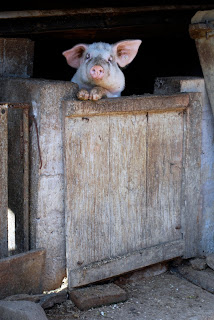 In "Eating Animals" (2009), the author asks the reader to exercise her moral imagination.
In "Eating Animals" (2009), the author asks the reader to exercise her moral imagination.For example, look at the pig's face. It seems sociable, curious, and intelligent. In fact, pigs are very intelligent. So what are we to make of the fact that man forces tens of millions of them into an overcrowded, hellish existence? We genetically engineer them, render them incapable of living in nature, stuff them with antibiotics, herd them into pens where they live on top of each other, sometimes beat them senseless with pipes or stick lit cigarettes into them, and generally make them suffer an abbreviated life until death at the slaughterhouse. The end must come as a release.
So why, asks Jonathan Safran Foer, when we buy a package of breakfast links, do we support such a system?
Of course, the ends justify the means, right? After all, we eat these animals--they are our food. And factory farming, a mode of corporate production spreading across China now, just as it has in the U.S., brings it to our table cheap. The bottom line is the only thing that matters.
Foer wants us to think about such things, because we currently don't think about them at all. We are in deep, collective denial.
For a moment, though, put aside the moral as well as the obvious dietary reasons not to eat factory farmed animals. The environmental reasons against it are compelling. Foer says millions of individual decisions to boycott farmed animals "will help prevent deforestation, curb global warming, reduce pollution, save oil reserves, lessen the burden on rural America, and help eliminate the most systematic animal abuse in world history (p.257)."
Foer pines for the localized animal husbandry evident in the picture I took of the pig. That was in a small village in Yunnan province, China, where families raise pigs intimately and care for them as if a pet. Don't be confused, though, about the ultimate outcome. That pig will be slaughtered, probably at the hands of the village butcher, some of his parts eaten by the family, and the rest put to market.
The question is not one of animal rights, but animal welfare. Can we treat animals more humanely on their way to our table, or is factory farming here to stay?
No comments:
Post a Comment